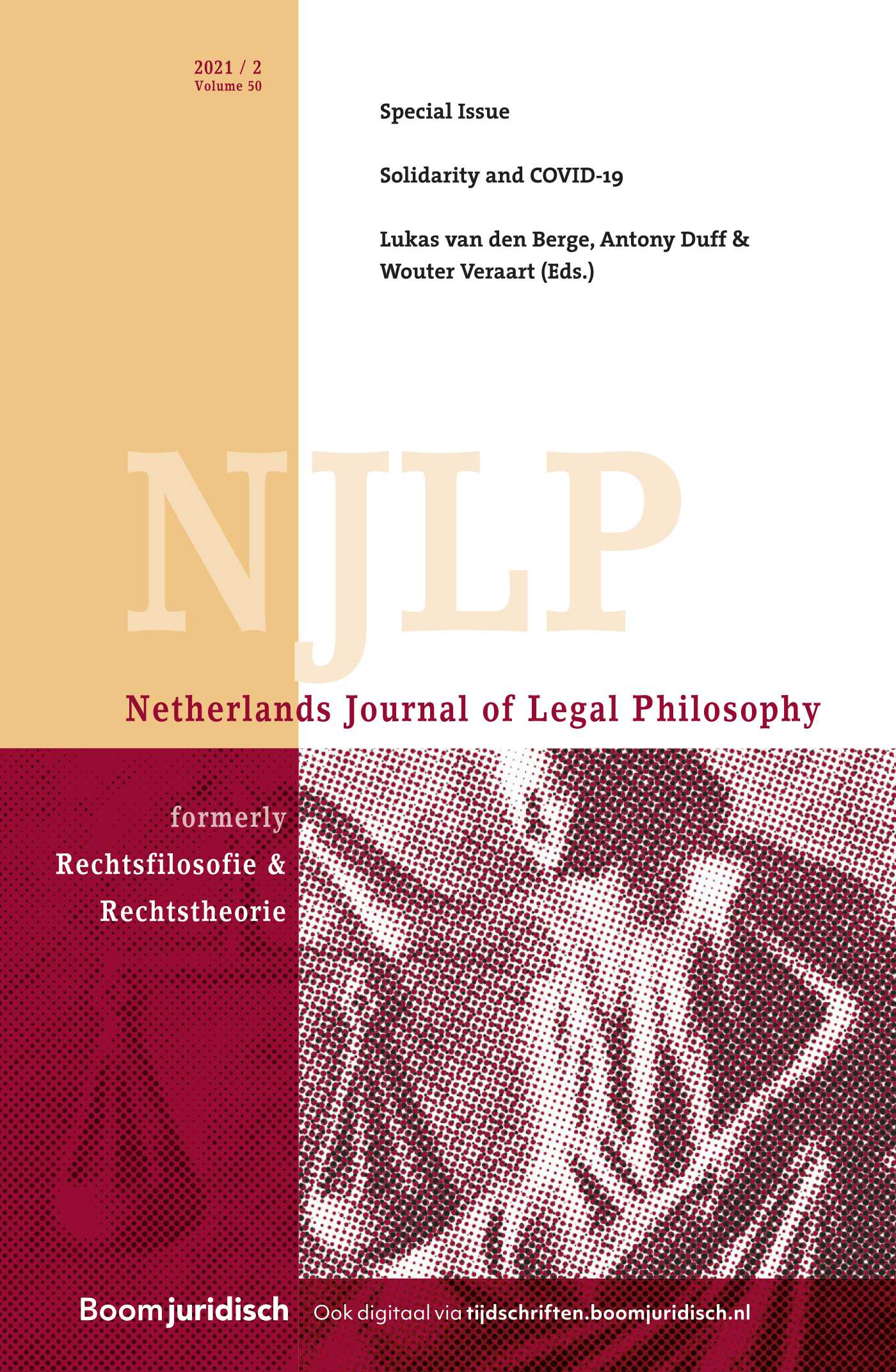|
Increasingly often, it is stated that the universal values underpinning Western liberal democracies are a product of a ‘Judeo-Christian’ tradition. This article explores the legitimacy of this claim from the perspective of liberal-democratic theory. It argues that state-endorsed claims about the historical roots of liberal-democratic values are problematic (1) if they are promoted as though they are above democratic scrutiny and (2) if they insinuate that citizens who belong to a particular (majority) culture remain the ‘cultural owners’ of the core values underpinning the state. More pragmatically, the paper suggests that the claim carries the risk of failing to facilitate all citizens becoming or remaining committed to nurturing fundamental rights and a shared society based on norms of democratic equality. |


Netherlands Journal of Legal Philosophy
About this journalSubscribe to the email alerts for this journal here to receive notifications when a new issue is at your disposal.
| Discussion |
|
| Keywords | Biopolitics, Coronavirus, Rule of law, Foucault, Agamben |
| Authors | Lukas van den Berge |
| Author's information |
| Article |
|
| Keywords | national identity, historical narratives, universal values, equal citizenship |
| Authors | Tamar de Waal |
| AbstractAuthor's information |
| Article |
|
| Keywords | Concepts, Contextualism, Essentially Contested Concepts, Legal Theory, Freedom |
| Authors | Dora Kostakopoulou |
| AbstractAuthor's information |
|
Socio-political concepts are not singularities. They are, instead, complex and evolving contextures. An awareness of the latter and of what we need to do when we handle concepts opens up space for the resolution of political disagreements and multiplies opportunities for constructive dialogue and understanding. In this article, I argue that the concepts-as-contextures perspective can unravel conceptual connectivity and interweaving, and I substantiate this by examining the ‘contexture’ of liberty. I show that the different, and seemingly contested, definitions of liberty are the product of mixed articulations and the development of associative discursive links within a contexture. |
| Article |
|
| Keywords | organ donation, ethics of organ donation, symbolic nature of the human body, ethics and ritual, symbolic legislation theory |
| Authors | Herman De Dijn |
| AbstractAuthor's information |
|
In countries like Belgium and The Netherlands, there seems to be overwhelming public acceptance of transplantation and organ donation. Yet, paradoxically, part of the public refuses post-mortal donation of their own organs or of those of family members. It is customary within the transplantation context to accept the refusal of organ donation by family members “in order to accommodate their feelings”. I argue that this attitude does not take seriously what is really behind the refusal of donation by (at least some) family members. My hypothesis is that even in very secularized societies, this refusal is determined by cultural-symbolic attitudes vis-à-vis the (dead) human body (and some of its parts). The blind spot for this reality, both in the practice of and discussions around organ donation, prevents understanding of what is producing the paradox mentioned. |
| Article |
|
| Authors | Leni Franken and François Levrau |
| AbstractAuthor's information |
|
In this article we elaborate on the place of religion in the workplace. Does the individual freedom of religion imply that employers must always accommodate the religious claims of employees or can they boast a number of arguments allowing them to legitimately limit that freedom? And, conversely, do employers not also have a right to freedom of religion and a right to formulate certain religious expectations for their employees? In this contribution, we deal with these and related questions from a legal-philosophical perspective. The overall aim is to illustrate the extent to which univocal answers are jeopardized because of conceptual ambiguities. We first make a normative distinction between two strategies (i.e. difference-blind approach and difference-sensitive approach) and subsequently illustrate and elaborate on how and why these strategies can lead to different outcomes in legal cases. We illustrate the extent to which a contextual and proportional analysis can be a way out in theoretical and practical conundrums. |
| Article |
|
| Authors | Vincent Dupont |
| AbstractAuthor's information |
|
Ever since it was published in 2015, the judgment of the The Hague court in the so-called Urgenda-case, and the subsequent decisions of the appellate and cassation courts confirming it, have been met with repeated and vivid critiques. By recognizing the necessity of the reduction in greenhouse gas emissions, and furthermore imposing a certain reduction level on the Dutch state, the judgments in the cases at hand gave rise to many questions concerning the position of the judiciary in the matter, and in Dutch society as a whole. This article attempts in the first place to situate the positions of the different actors intervening in the Urgenda-case within a legal-theoretical framework. The contribution subsequently explores the strategic possibilities that an alternative understanding of law could offer to the judges, focusing specifically on the use of legal instruments stemming from international law, brought into the reasoning of the national judge. |
| Discussion |
|
| Authors | Klaas Rozemond |
| Author's information |
| Book Review |
|
| Authors | Klaas Rozemond |
| Author's information |
| Book Review |
|
| Authors | Irawan Sewandono |
| Author's information |
| Book Review |
|
| Keywords | Vervreemding, Naleving van wetten, Legitimiteit, Rule of Law |
| Authors | Irawan Sewandono |
| Author's information |
| Book Review |
|
| Keywords | rechtsvinding, dialoog, empathie |
| Authors | Irawan Sewandono |
| Author's information |
| Book Review |
|
| Keywords | sharia, Greece |
| Authors | Irawan Sewandono |
| Author's information |
| Book Review |
|
| Authors | Irawan Sewandono |
| Author's information |

 Issue 2
Issue 2